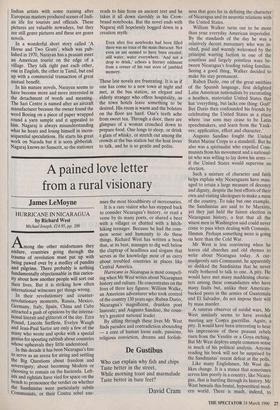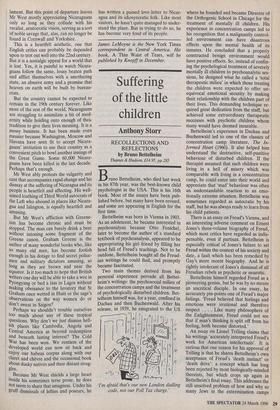A pained love letter from a rural visionary
James LeMoyne
HURRICANE IN NICARAGUA by Richard West MichaeLloseph, f14.95, pp. 288 Among the other misfortunes they endure, countries going through the trauma of revolution must put up with being pawed over by a medley of pundits and pilgrims. There probably is nothing fundamentally objectionable in this curios- ity about how another people will sort out their lives. But it is striking how often International witnesses get things wrong._ In their revolutionary and counter- revolutionary moments, Russia, Mexico, Germany, Italy, Spain, China and Cuba attracted a gush of opinions by the interna- tional literati and glitterati of the day. Ezra Pound, Lincoln Steffens, Evelyn Waugh and Jean-Paul Sartre are only a few of the Many who wrote and spoke with a special genius for spouting rubbish about countries whose upheavals they little understood. In this decade it has been Nicaragua's fate to serve as an arena for airing and settling the Big Questions about freedom and sovereignty; about becoming Modern or choosing to remain on the hacienda. Left- ists and rightists have vied for space on the bench to pronounce the verdict on whether the Sandinistas were particularly subtle Communists, or their Contra rebel ene- mies the most bloodthirsty of mercenaries.
It is a rare visitor who has stepped back to consider Nicaragua's history, or read a verse by its many poets, or shared a beer with a villager or chatted with a hitch- hiking teenager. Because he had the com- mon sense and humanity to do these things, Richard West has written a book that, at its best, manages to dig well below the claptrap of headlines and slogans that serves as the knowledge most of us carry about troubled countries in places like Central America.
Hurricane in Nicaragua is most compell- ing when Mr West writes about Nicaraguan history and culture. He concentrates on the lives of three key figures: William Walke, an American adventurer who took control of the country 130 years ago; Ruben Dario, Nicaragua's magnificent, drunken poet laureate; and Augusto Sandino, the coun- try's greatest national leader. By sifting through these lives Mr West finds paradox and contradiction abounding — a core of human loose ends, passions, religious conviction, dreams and foolish- ness that goes far in defining the character of Nicaragua and its neurotic relations with the United States.
William Walker turns out to be more than your everyday American imperialist. By the standards of the day he was a relatively decent mercenary who was in- vited, paid and warmly welcomed by the principal warring faction in one of the countless and largely pointless wars be- tween Nicaragua's feuding ruling families. Seeing a good thing, Walker decided to make his stay permanent.
Ruben Dario, one of the great smithies of the Spanish language, first delighted Latin American nationalists by excoriating a heathen, materialist United States that has 'everything, but lacks one thing: God!' But Dario then confounded his friends by celebrating the United States as a place where 'our sons may cease to be Latin speechmakers, and learn from the Yank- ees; application, effort and character.'
Augusto Sandino fought the United States Marine Corps to a standstill. But he also was a spiritualist who expelled Com- munists from his movement and a national- ist who was willing to lay down his arms if the United States would supervise an election.
Such a mixture of character and faith helps explain why Nicaraguans have man- aged to retain a large measure of decency and dignity, despite the best efforts of their own and visiting ideologues to make a mess of the country. To take but one example, the Sandinistas are said to be Marxists, yet they just held the fairest election in Nicaraguan history, a feat that all the wisest men in Washington said could never come to pass when dealing with Commies. Hmmm. Perhaps something more is going on here than the Cold War.
Mr West is less convincing when he leaves old churches and old rhymes to write about Nicaragua today. A cur- mudgeonly anti-Communist, he apparently so disliked the Sandinistas that he never really bothered to talk to one. A pity. He would have met many maddening charac- ters among these comandantes who have many faults but, unlike their American- backed peers in the armies of Guatemala and El Salvador, do not impose their will by mass murder.
A veteran observer of sordid wars, Mr West similarly seems to have avoided meeting any Contra guerrillas. Again, a pity. It would have been interesting to hear his impressions of these peasant rebels risen from the Vendee or a Goya etching. But Mr West deploys ample common sense in much of his political analysis. Anyone reading his book will not be surprised by the Sandinistas' recent defeat at the polls. Like many Englishmen, Mr West dis- likes change. It is a stance that sometimes serves him poorly in a country, like Nicara- gua, that is hurtling through its history. Mr West bewails this brutal, hypocritical mod- ern world. There is much, indeed, to lament. But this point of departure leaves Mr West mostly appreciating Nicaraguans only so long as they collude with his ruralist, aristocratic vision, serving as a sort of noble savage that, alas, can no longer be found in Cornwall and Yorkshire.
This is a heartfelt aesthetic, one that English critics can probably be depended upon to trot out well into the 22nd century. But it is a nostalgic appeal for a world that is lost. Yes, it is painful to watch Nicara- guans follow the same, lousy beaten path and afflict themselves with a smothering state, an abusive army and a promise that heaven on earth will be built by. bureau- crats.
But the country cannot be expected to remain in the 19th century forever. Like most of the rest of the world, Nicaraguans are struggling to assimilate a bit of mod- ernity while holding onto enough of theil tradition to give their lives meaning. It is a messy business. It has been made even messier because Washington, Moscow and Havana have seen fit to accept Nicara- guans' invitation to use their country as a convenient pitch to bowl another innings of the Great Game. Some 60,000 Nicara- guans have been killed in the last decade. Perhaps that's enough. Mr West ably protests the vulgarity and cant that accompanies rapid change and his dismay at the suffering of Nicaragua and its people is heartfelt and affecting. His well- aimed loathing of Third World autocrats of the Left who abound in places like Nicara- gua and Islington, is equally heartfelt and amusing.
But Mr West's affliction with Greene- ism has become chronic and must be stopped. The man can barely drink a beer without intoning some fragment of the Greene canon. Graham Greene is the author of many wonderful books who, like so many old men, has become foolish enough in his dotage to find secret police- men and military dictators amusing, so long as they are brown and near the equator. Is it too much to hope that British writers one day will be able to take a wee in Pyongyang or bed a lass in Lagos without making obeisance to the lavatory that St Graham once wetted in Haiti or the sage's observations on the way women do or don't sweat in Saigon? Perhaps we shouldn't trouble ourselves too much about any of these tropical questions. Why don't we just dismiss hell- ish places like Cambodia, Angola and Central America as beyond redemption and beneath lasting interest? The Cold War has been won. We rentiers of the developed world can now sit back and enjoy our habeas corpus along with our claret and chevre and the occasional book about dusky natives and their distant strug- gles.
Because Mr West shields a large heart inside his sometimes terse prose, he does not seem to share that smugness. Under his gruff dismissals of lefties and poseurs, he has written a pained love letter to Nicar- agua and its idiosyncratic folk. Like most visitors, he hasn't quite managed to under- stand the place. But in trying to do so, he has become very fond of its people.
James LeMoyne is the New York Times correspondent in Central America. His book, A Thin Waist of Tears, will be published by Knopff in December.



















































 Previous page
Previous page